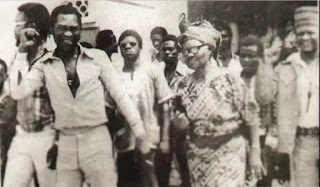During the Colonial administration in 1918, Governor-General, Fredrick Lugard had introduced direct taxation system, he created grassroot form of governance which was similitude to the present Local government administration in Nigeria, but it is being called the Sole Native Authority. British used it as a form of indirect rule which the traditional rulers, Kings acted as agents for the colonial government.
The then Alake of Egbaland, His Royal Highness, Oba Samuel Ladapo Ademola headed Egba native Authority with the Admistrative office at Ake palace.
The agents of the King and the policemen were using all forms of violence, insults and harrassment to collect taxes levelled by the British government, this act did not go down well with Egba women who had no female representative in the Sole native Authority.
The women led Mrs. Funmilayo Ransome-Kuti and Alake' sister in law who was the mother of Professor Wole Soyinka, Mrs. Eniola Soyinka opposed the taxes and kicked against the method of collecting the taxes as unfair and crude ways.
Mrs. Funmilayo Ransome-Kuti was the first female student who was admitted into Abeokuta Grammar School, the school was then located directly opposite her family house at Isale-Igbein in Abeokuta. She also went to England for further studies. After, She returned to become a teacher and activist in Nigeria.
Mrs. Funmilayo Ransome-Kuti was the first female student who was admitted into Abeokuta Grammar School, the school was then located directly opposite her family house at Isale-Igbein in Abeokuta. She also went to England for further studies. After, She returned to become a teacher and activist in Nigeria.
She married the Reverend Israel Oludotun Ransome-Kuti on the January 20, 1925. Revd. Oludotun was one of the founders of both the Nigeria Union of Teachers (NUT) and the Nigerian Union of Students, now called, National Association of Nigerians Students (NANS). Their marriage was blessed with four children, Olikoye, Beko, Fela and Dolapo.
Funmilayo Ransome-Kuti formed Abeokuta Ladies Club in 1923, the group was made up of educated Young ladies and women. They used to meet at Igbein area of Abeokuta.
In 1943 to 1946, the Abeokuta Ladies Club extended the membership to market women who had suffered in the hands of tax collectors, the policemen. They renamed the group as Abeokuta Women's Union (AWU).
The information had it that Alake of Egbaland was diverting seized bags of rice from the market women to his personal stores, selling it and pocketing the money. This offence Coupled with the heavy burden of the unbearable taxes and non-representation of women in governance forced the Egba women to unite against Alake of Egbaland and Colonial government that sidelined them. Women rejected government price control on goods, they opposed the taxes levelled against them. They staged protests and organised press conferences on reckless policies.
Instead of Alake to reduce the taxes, he increased the tax rate for women towards the end of 1946. This sparked off the daily and non-stop protests. Alake ignored all the pleas, and pretended he did not see protest, Press conferences and press releases by the women in the newspapers in Abeokuta and Lagos.
In 1947, Funmilayo Ransome-Kuti failed to pay her taxes and was arrested by the Police. She was charged to Court in Ake.
she pleaded “not guilty”, Ẹjọ Ku s'Ake.....the case ended.
she pleaded “not guilty”, Ẹjọ Ku s'Ake.....the case ended.
The first overwhelmed protest was held on November 29 and 30, 1947 which thousands of women took part at Ake palace and its environs. Many women were arrested, jailed and later released.
On the first week of January 1948, Funmilayo Ransome- Kuti was banned from entering Alake palace for insulting the Alake and the British administration supported the ban. The government used the opportunity of the ban and invited the executive members of Abeokuta women's Union for meetings with exclusion of their President, Funmilayo Kuti. They all refused to attend any meeting, even called by the British government.
The women went back to the streets again, they were more determined to remove Alake. They planned to be naked which was a taboo.
By June, Alake decided to go for holidays in Jo's, Plateau. He constituted Special committee on investigation and complaints of women. Alake also abolished the taxes but women were no longer interested in his administration.
The British government intervened in the crisis. They made promises to the women that the taxes would be suspended in the next three days. When the women noticed and observed that it was fake promises, they returned to the streets and marched to the Alake palace with over 10,000 women.
They started the protest on the 8th of December and demanded for the release of the arrested women and by the 10th the detained women were freed.
Egba women continued their protests, they called for the removal of Alake of Egbaland. The protest became unbearable for the government.
On the 3rd of January, 1949, the King abdicated the throne and went into exile. He was in exile for one year until everything was calm. When he came back, he did not make any law against the women.












1 comments:
Do u have an adsense account for sale
Please whatsapp me on 08143552187
Post a Comment